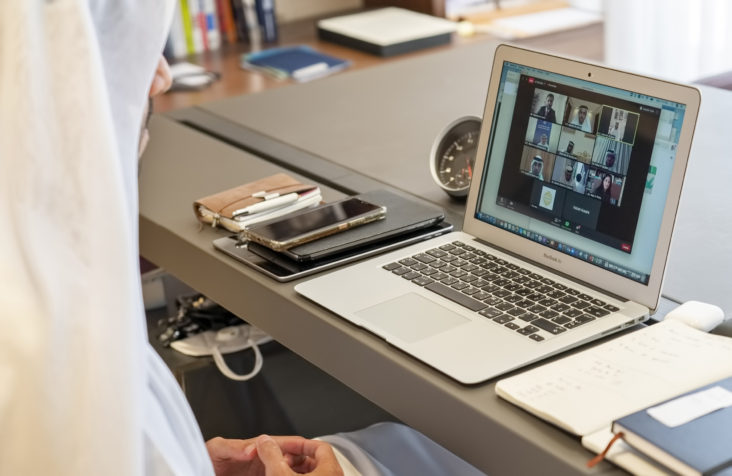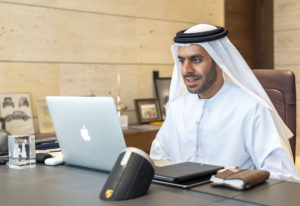Sharjah Economic Ramadan Majlis: UAE’s Dh282 bn Stimulus Package Strongest In The Region, Will Accelerate Recovery & Growth Across Sectors

In the presence of senior government officials, diplomats, CEOs, business owners and investors from the UAE’s public and private sectors, the sixth edition of the Sharjah Economic Ramadan Majlis explored how the UAE’s economic stimulus packages have positively impacted major industry sectors, markets and businesses, and recommended response strategies to help businesses in the UAE recover from the coronavirus crisis.
Under the theme, ‘Impact of the UAE Stimulus Plan on Economic Stability and Growth’, the Majlis was convened on Wednesday, May 13, on a virtual platform.
Organised by the Sharjah Investment and Development Authority (Shurooq), in collaboration with the Sharjah Chamber of Commerce and Industry (SCCI) and Sharjah FDI Office (Invest in Sharjah), the virtual majlis session focused on four key pillars – economic stimulus package and enhancement of investors’ confidence, lessons learned from the crisis, vibrant key sectors and creative experiences, and wise vision.
The panel of speakers at the session included H.E. Abdulla Al Saleh, Under Secretary of the Foreign Trade and Industry, UAE Ministry of Economy; H.E. Marwan bin Jassim Al Sarkal, Executive Chairman, Shurooq; H.E. Fahad Al Gergawi, CEO, Dubai Investment Development Agency (Dubai FDI); and H.E. Hussain Al Mahmoudi – CEO, Sharjah Research Technology and Innovation Park (SRTI).
Other prominent dignitaries speaking at the virtual majlis were Ms. Najla Al Midfa, CEO, Sharjah Entrepreneurship Centre (Sheraa); H.E. Mohammed Abdallah, CEO, Sharjah Islamic Bank; Mr. Mohamed Juma Al Musharrkh, CEO at Sharjah FDI Office (Invest in Sharjah); and Mr. Sameh Abdulla Al Qubaisi, Deputy Director General, Abu Dhabi Investment Office.
Highlighting the comprehensive economic support packages rolled out by the UAE to fend off the impact of the coronavirus on the business sector, H.E. Abdulla Al Saleh, said, “As part of the long-term stimulus plan to speed up recovery and encourage investments, the UAE government’s economic stimulus package targeting the financial and private sector has totaledDh282 billion till date, and will be focused on sectors most directly affected by the pandemic including SMEs.”
He continued: “A new committee headed the UAE Minister of Economy is charting out short, mid and long-term recovery plans including revising existing strategies to shape the future of the UAE economy,” he added. “The strength of the UAE economy lies in its high competitiveness and diversification strategy. At the same time, we will benefit from the efficiency of government policies related to financial and trade sectors together with the competence and close collaboration of companies operating in both the public and private sectors, which have enabled the nation to overcome economic crises in the past.”
He added: “We are living at a historical moment in human history,” said Al Saleh. “This is not only a health crisis, but the impact is being felt everywhere – business, economy, social life, culture, relations between nations, travel and tourism, and more. The pandemic has led us into a new era of working and doing business. We are accelerating into the digital economy earlier than imagined – our digital goals for 2030 are now being realized in 2020 due to the onset of COVID-19.”
H.E. Marwan bin Jassim Al Sarkal further reiterated the vital role of the UAE government in providing timely reassurance to the business community through the introduction of a host of stimulus packages. “The government of Sharjah has been targeting every single sector from aviation and free zones to ports, SMEs and more, as the COVID-19 impact has been felt across all sectors. Sharjah’s current three-month stimulus package is based on the existing realities and may be extended upon reviewing the situation.”
Sharjah had embarked on a comprehensive digital transformation strategy early on under the guidance of Sheikh Fahim bin Sultan Al Qasimi, Chairman of the Higher Committee of Digital Transformation of Sharjah, and the UAE’s digital agenda which forms the core of its national vision has enabled it “to do better as a nation because we are prepared, especially on the digital front,” he added.
H.E. Fahad Al Gergawi noted: “This is an overall reality check for our lives, our government strategies and commitments, and our corporate policies. This government and the nation were put onvirtual work mode over one weekend, and we did not falter. We are adapting to our new realities and we will come out of this stronger, not just as a nation but as one world.”
Underlining the significance of the stimulus packages in enhancing the UAE’s competitiveness in the global economic ecosystem, he said that the nation had offered the “strongest stimulus incentives in the region, which will accelerate recovery and advance growth in key, emerging sectors.”
He added: “Although some sectors such as tourism, aviation, petrochemicals, and retail took a severe hit, some are seeing a rise in prominence including technology, R&D, healthcare, education and the food business. The UAE’s preparedness on the digital front is paying dividends now and these high priority sectors will see significant investments in the future.”
Discussing how leveraging technology could provide new benefits and opportunities, H.E. Hussain Al Mahmoudi said: “As a nation, the UAE has proven its ability in harnessing technologies and adopting digital transformation strategies to improve productivity and boost economic output.”
He continued: “We have transitioned from a phase of fear to learning, and this pandemic has been instrumental in accelerating our journey to a more digitally powered world. Emerging technologies are today transforming business interactions and daily lives and going forward, will continue to drive advances in education, economy, healthcare, and society.”
According to Najla Al Midfa, “SMEs have had a busy time in the wake of the global pandemic as despite the setbacks in certain sectors, it has also brought forth many opportunities for other sectors.”
“A bottoms-up approach is what Sheraa is focusing on to stimulate SME growth,” she added. “Our most significant initiative is the US$1 million solidarity fund launched by Sheikha Bodour Bint Sultan Al Qasimi, Chairperson of Shurooq, to help startups impacted by COVID-19. The fund will provide emergency funding in the form of grants to startups that had strong business models but are reeling under the current circumstances. The fund will also integrate start-ups through supply chains for products and services procured either by Sheraa or by its partners in Sharjah.”
SMEs developing solutions to address the pandemic will form the third category of beneficiaries, she added, and would comprise of start-ups in health tech, logistics, education, and employment.
On his part, Mohammad Juma Al Musharrkh, CEO of Invest in Sharjah, outlined the number of initiatives the Sharjah Investors Services Centre (Saeed) has done to support investors and their needs during their “remote working” periods: “We have launched a series of initiatives to support all of our new and existing clients varying from investors and business owners in Sharjah, whose requirements vary from renewing trade licenses or arranging necessary documentations to help in their decision of changing their lines of products and services in light of the current COVID-19.”
He added: “Our initiative also includes allocating a number of our staff personnel who are mobile and working to attend to all of our client’s needs directly from their homes and through contactless delivery of paper work. This is part of our strategy to make sure continuity of work and operations for our clients and maintaining the highest standards of happiness and health.”
The 120-minute virtual majlis was attended by a host of media representatives from across the UAE and was moderated by Abdul Karim Hanif, presenter and multimedia journalist at Sharjah’s Pulse 95.



